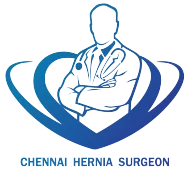Paraesophageal hernia occurs in the esophageal hiatus region of the body. The esophageal hiatus is an opening on the diaphragm that separates the chest from the abdominal region.
When a paraesophageal hernia occurs, the abdominal and chest cavity organs encounter discomfort. These discomforts and pain in the chest and abdominal region are primary signs of paraesophageal hernia.
Hernias require surgical intervention most of the time. This is the same with paraesophageal hernia as well.
Your hernia specialist will prescribe the kind of treatment based on the size, location, and severity of the paraesophageal hernia.
Upgraded and minimally invasive procedures are available to treat paraesophageal hiatal hernia with little to no blood loss and a faster recovery rate.
Table of Contents
ToggleSymptoms of Paraesophageal Hernia
Paraesophageal hernia causes disturbance mainly in the digestive tract and the chest area.
Some paraesophageal hernia symptoms include:
- Severe Chest Pain: When the contents of the stomach move up into the chest cavity it may press against the chest organs resulting in severe chest pain.
- Shortness of Breath: If the hernia presses against the lungs it can result in shortness of breath.
- Difficulty in Swallowing: With increasing size of the hernia the act of swallowing may also turn difficult.
- Nausea and Vomiting: With the food getting trapped in the digestive tract and difficulty in digestion nausea and vomiting can occur.
- Stomach Pain: With the movement of the stomach and its contents the result of stomach pain occurs.
- Indigestion: With all the twisting and squeezing and the movement of stomach acid the process of indigestion may become difficult. Bloating and an increase in an uncomfortable level of gas in the abdominal region may also occur.
- Gastric Acid Reflux: Due to the movement of the stomach contents the acid in the stomach gets transported back and forth into the esophagus irritating the esophageal lining. This results in severe heartburn. This symptom is also called Gastroesophageal reflux disease (GERD).
- Gastric Volvulus: Gastric volvulus refers to the rotation of the stomach. When the stomach ascends next to the esophagus the stomach may get into an upside position causing severe pain, retching, and so on.
- Ulcers: When the mucosal lining of the esophagus gets frequent acid reflux and lacks enough blood supply due to the constrictions of the hernia ulcers can appear at the neck of the hernia. This is called Cameron’s erosions and can cause severe irritation in the esophageal region.
Complications of Paraesophageal Hernia
Paraesophageal hernia may be less common but it is a more serious one. It needs to be treated at the right time to prevent strangulation or incarceration.
Some paraesophageal hernias exhibit no symptoms at all. Such hernias are also to be observed and consulted for the requirement of surgery or not.
Complications of paraesophageal hernia include:
- Strangulation: Also called ischemia it is a condition in which the blood flow to the tissues of the organs gets cut off due to constriction of the hernia.
- Incarceration: The herniated organs get trapped and squeezed leading to strangulation.
- Bleeding: Cameron’s erosions cause ulcers that bleed and may lead to anemia.
- Gastric Volvulus: The stomach gets twisted causing difficulty in swallowing, retching, and pain.
- Breathing Trouble: Large-size hernia disrupt the expansion of lugs resulting in shortness of breath.
When these complications arise it is advisable to get your paraesophageal hernia immediately treated.
Treatments for Paraesophageal Hernia
When the paraesophageal hernia begins to show symptoms there is a possibility of the hernia turning into a strangulated or incarcerated hernia.
Strangulated and incarcerated hernia can turn fatal and require immediate repair.
Non-surgical Treatment
The side effects of paraesophageal hernia such as heartburn, nausea, etc. can be treated without surgery through modified lifestyle practices, an appropriate diet like the pre-op diet for hiatal hernia surgery, and so on.
However, hiatal hernia repair without surgery is not a complete possibility.
Surgical Treatment
Symptomatic paraesophageal hernia requires surgical intervention. If you show signs of bleeding from the esophageal region, gastric volvulus, breathing trouble, strangulated or incarcerated hernia quickly undergo a hernia surgery.
Laparoscopic surgery is widely employed to treat paraesophageal hernia. It is minimally invasive and operates through the abdominal region itself without disturbing the chest portion.
There are certain tests done before hiatal surgery such as barium swallow, esophageal manometry and so on which you will be asked to undertake.
Based on the prescribed physical examination your hernia specialist will assess the location, size, and severity of your paraesophageal hernia and prescribe the appropriate surgical procedure.
The surgical options available to treat paraesophageal hernia include:
- Laparoscopic surgery
- Robotic surgery
- Open surgery
During the surgery, the herniated organs are eased down through the hiatus on the diaphragm to their original position, and the hiatus is closed to prevent future hernia. Or else, the top of the stomach is wrapped around the lower part of the esophagus through stitching.
Causes of Paraesophageal Hernia
The possible reasons for the occurrence of paraesophageal hernia include:
- Large hiatus at birth
- Obesity
- Lifting heavy objects
- Repeated vomiting
- Chronic coughs
- Strained bowel movements
- Wear and tear of the hiatus with age (usually above 50 years of age)
- Blunt trauma or injury (eg: Seatbelt pressure on the hiatal region during a road accident)
Conclusion
Paraesophageal hernia may be painful and wearisome but it will go away with appropriate treatment in due time.
There are various surgical procedures available to treat paraesophageal hiatal hernia. So contact a hernia specialist as soon as you encounter any of the above-listed symptoms and complications.
To know more details about paraesophageal hiatal hernia symptoms and treatment contact a hernia specialist.
Dr. K. Amilthan MBBS., MS., FMAS., FALS.
Heal Your Hernia Now:
- 15+ Years of Experience
- 3,000+ Surgeries
Your Journey to Wellness Begins with us.
FAQ's
Yes, a paraesophageal hernia will go away if treated in due time. Make sure not to leave the hernia to turn strangulated or incarcerated as it can cause mortality.
The treatment for a paraesophageal hernia is based on its size and severity. Your hernia specialist will decide upon the kind of treatment based on an examination of the hernia. Surgical intervention will include laparoscopic, robotic, or open surgery.
Most paraesophageal hernias require surgery. If the hernia causes pains and related symptoms, it will need surgery. If it does not cause disturbances of any kind or affect any body function, you can leave it as it is.

Dr. Amilthan
Dr. Amilthan is a renowned laparoscopic hernia surgeon based in Chennai, with over 15+ years of experience in general surgery. He completed his MBBS and MS in General Surgery at Kilpauk Medical College and Government Royapettah Hospital in Chennai.
- All Posts
- Hernia Blog

Which Doctor should you consult for Hernia? You can Consult a general surgeon or a hernia specialist for evaluation and...

A hernia occurs when an organ or any other part of your body pushes through the muscle and surrounding tissue...

An inguinal hernia occurs when the organs push through and bulge against the weak muscles of the abdomen. An effective...

